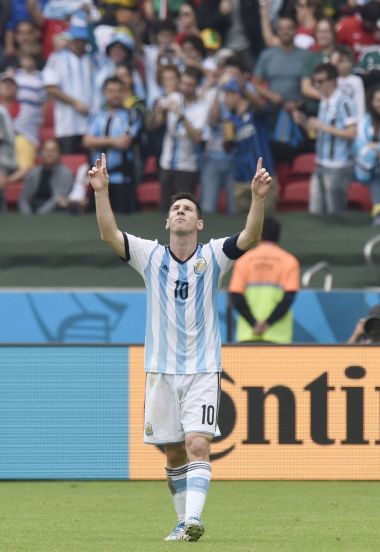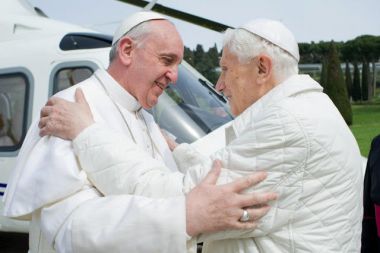Argentina vs Germany: World Cup final players profess Christ
It's been heralded as the greatest World Cup of all time. There have been wonder goals and displays of extraordinary goalkeeping; freak results and tense penalty shoot-outs. New stars have emerged, and others have enjoyed their final flourish. There's been controversy, drama, and most of all, great football. Brazil 2014 is the tournament that's had everything.
One of the interesting features of the tournament has been the clear outward displays of faith from Christian players, such as England's Daniel Sturridge and Brazil's David Luiz. The whole World Cup seems to have been full of footballers who are proud and open about the religious beliefs they hold, and Sunday's final, in which Germany face Argentina, will be no exception.

With fellow countryman Pope Francis cheering on from the sidelines, Argentina include a strong core of Catholic players. Lionel Messi, arguably the world's greatest player, is a committed believer, who described meeting Francis last year as one of the highlights of his life. He often crosses himself on the pitch, thanks the heavens after scoring, and is rumoured to have undertaken a significant pilgrimage to Medjugorje, a holy Catholic shrine in Herzegovina.
It's not only Messi who flies the faith flag however. Team-mates Maxi Rodriguez and Javier Mascherano - both former Liverpool players - joined their talismanic captain during the audience with the Pope, as did Manchester City's Pablo Zabaleta. And there's one Argentinian player who takes things even further - a strong Christian, striker Ezequiel Lavezzi has a tattoo of Jesus Christ emblazoned across his chest.
Thanks to the on-pitch activities of team such as Brazil, the faith of South American players may come as little surprise. However, lining up in opposition on Sunday night is a team from Europe with just as strong a religious contingent.
Germany too boast several Catholics, including the Polish-born strikers Lukas Podolski and Miroslav Klose, and goalkeeper Manuel Neuer, who supports a Catholic youth club and social action project in his home town. Klose told a journalist: "I am a devout Catholic... belief in God has a permanent place in my private life."

The team also includes a number of Protestant players, including young attacking midfielder Mario Götze, who recently posted on his Facebook page: "Dear God, I want to take a minute, not to you to ask for something, but simply to say thank you for everything I have." And rather cryptically, team-mate Bastian Schweinsteiger claims he says "a little prayer, now and then to the top", and is convinced that "God is within the game of my life."
In defence, Germany can field a triumvirate of Christian players. Arsenal defender Per Mertesacker, who is an ambassador for the Evangelical Youth and Child Hospice in Wilhelmshaven, says "Christ has taught us to be there for others", while colleague Jerome Boateng is covered in Christian tattoos. Marauding full-back Philipp Lahm has been a public supporter of the Ecumenical church in Munich, and told an interviewer that "after life not everything is over", and described Jesus as "the most important person in history."

Germany, like Argentina, can claim Papal support - this time from the now-retired Pope Benedict. Which only adds to the theory that God is unlikely to support or favour one team over the other on Sunday night. Whoever wins however, the tournament leaves two inspiring legacies - a festival of fantastic football which will live long in the memory, and an event, watched by billions around the globe, at which many players were unashamed to tell the world of their faith in Jesus.











